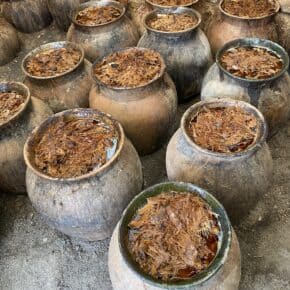Bagazo (bagasso, bagaso, bagasse) is the cooked and pulped agave fibers that remain after making mezcal. In the mezcal world, bagazo starts life as the piña or heart of the agave. That is harvested and roasted underground, then crushed into a pulp, which is fermented with water, creating the beer-like fluid that is distlled into mezcal. After fermentation and distillation, the remaining agave fiber, or bagazo, is either tossed away or repurposed.



Producers compost bagazo and use it as fertilizer. But if you look around a mezcal distillery, you’ll likely see it used everywhere as a sealant. When roasting agave, producers often cover the piñas with an insulating layer of bagazo. When they distill, they’ll frequently use the agave fibers to help seal and insulate the still. Some people are even working on dehydrating the bagazo and using it to fire their stills. That’s about as full circle as it gets.

Read more of our entries in the Mezcalistas Encyclopedia of Mezcal and email us questions or ideas for future entries.












Leave a Comment